外研版三起五年级上册
- 格式:ppt
- 大小:1.31 MB
- 文档页数:24
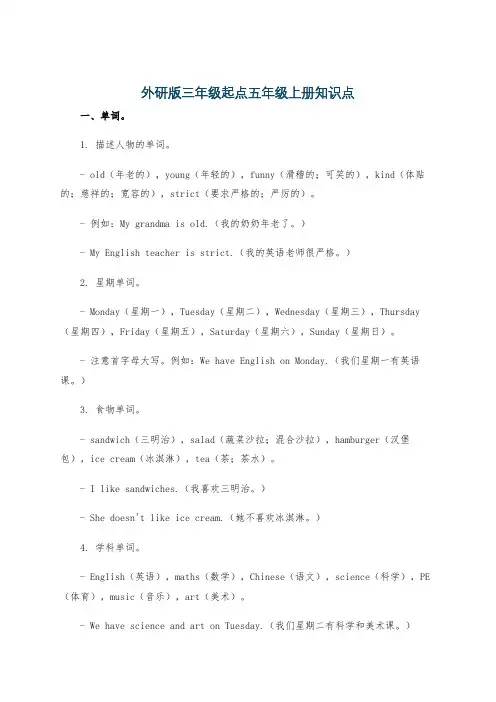
外研版三年级起点五年级上册知识点一、单词。
1. 描述人物的单词。
- old(年老的),young(年轻的),funny(滑稽的;可笑的),kind(体贴的;慈祥的;宽容的),strict(要求严格的;严厉的)。
- 例如:My grandma is old.(我的奶奶年老了。
)- My English teacher is strict.(我的英语老师很严格。
)2. 星期单词。
- Monday(星期一),Tuesday(星期二),Wednesday(星期三),Thursday (星期四),Friday(星期五),Saturday(星期六),Sunday(星期日)。
- 注意首字母大写。
例如:We have English on Monday.(我们星期一有英语课。
)3. 食物单词。
- sandwich(三明治),salad(蔬菜沙拉;混合沙拉),hamburger(汉堡包),ice cream(冰淇淋),tea(茶;茶水)。
- I like sandwiches.(我喜欢三明治。
)- She doesn't like ice cream.(她不喜欢冰淇淋。
)4. 学科单词。
- English(英语),maths(数学),Chinese(语文),science(科学),PE (体育),music(音乐),art(美术)。
- We have science and art on Tuesday.(我们星期二有科学和美术课。
)二、短语。
1. 描述人物的短语。
- be helpful(有用的;愿意帮忙的),be hard - working(工作努力的;辛勤的)。
- He is helpful at home.(他在家很乐于助人。
)- My sister is hard - working.(我的姐姐很勤奋。
)2. 与学校活动相关的短语。
- have classes(上课),do homework(做作业),read books(读书),play sports(做体育运动)。
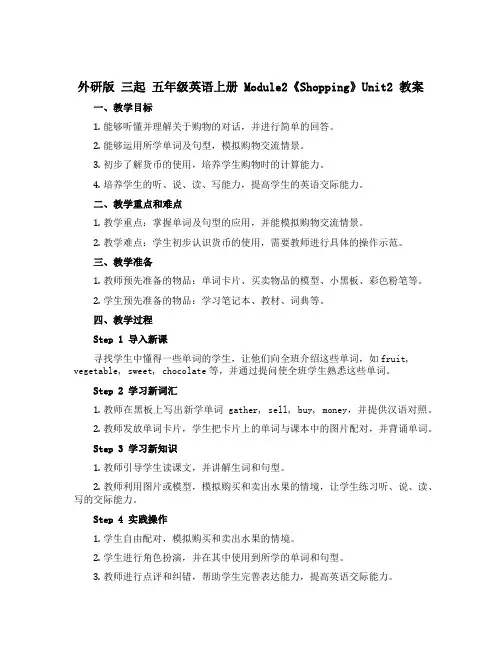
外研版三起五年级英语上册 Module2《Shopping》Unit2 教案一、教学目标1.能够听懂并理解关于购物的对话,并进行简单的回答。
2.能够运用所学单词及句型,模拟购物交流情景。
3.初步了解货币的使用,培养学生购物时的计算能力。
4.培养学生的听、说、读、写能力,提高学生的英语交际能力。
二、教学重点和难点1.教学重点:掌握单词及句型的应用,并能模拟购物交流情景。
2.教学难点:学生初步认识货币的使用,需要教师进行具体的操作示范。
三、教学准备1.教师预先准备的物品:单词卡片、买卖物品的模型、小黑板、彩色粉笔等。
2.学生预先准备的物品:学习笔记本、教材、词典等。
四、教学过程Step 1 导入新课寻找学生中懂得一些单词的学生,让他们向全班介绍这些单词,如fruit, vegetable, sweet, chocolate等,并通过提问使全班学生熟悉这些单词。
Step 2 学习新词汇1.教师在黑板上写出新学单词gather, sell, buy, money,并提供汉语对照。
2.教师发放单词卡片,学生把卡片上的单词与课本中的图片配对,并背诵单词。
Step 3 学习新知识1.教师引导学生读课文,并讲解生词和句型。
2.教师利用图片或模型,模拟购买和卖出水果的情境,让学生练习听、说、读、写的交际能力。
Step 4 实践操作1.学生自由配对,模拟购买和卖出水果的情境。
2.学生进行角色扮演,并在其中使用到所学的单词和句型。
3.教师进行点评和纠错,帮助学生完善表达能力,提高英语交际能力。
Step 5 课堂小结教师总结本节课学到的单词和句型,反复强调学生认识货币的使用,培养计算能力。
五、课后作业请学生将购物过程中所用到的若干单词用句子描述清楚,并准备下节课的复习。
六、教学反思本节课通过不同形式的教学,学生能够掌握这些单词和句型的应用,并且学生也通过角色扮演来提高自己的交际能力。
但是学生的运用货币的能力还需要教师进行具体的操作示范,下节课需要注重教育。
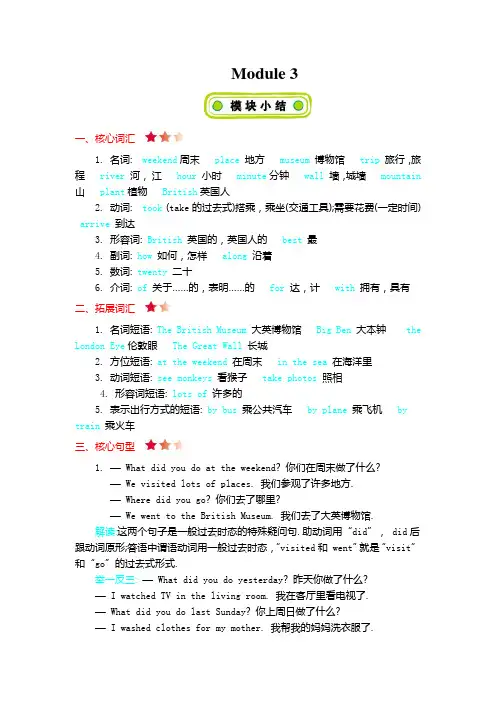
Module 3一、核心词汇1. 名词: weekend周末 place 地方 museum 博物馆 trip 旅行,旅程 river 河,江 hour 小时 minute分钟 wall 墙,城墙 mountain 山 plant植物 British英国人2. 动词: took(take的过去式)搭乘,乘坐(交通工具);需要花费(一定时间) arrive 到达3. 形容词:British 英国的,英国人的 best 最4. 副词:how如何,怎样 along 沿着5. 数词: twenty二十6. 介词:of 关于……的,表明……的 for 达,计 with 拥有,具有二、拓展词汇1. 名词短语:The British Museum大英博物馆 Big Ben 大本钟 the London Eye伦敦眼 The Great Wall 长城2. 方位短语:at the weekend 在周末 in the sea 在海洋里3. 动词短语:see monkeys 看猴子 take photos 照相4. 形容词短语:lots of 许多的5. 表示出行方式的短语:by bus 乘公共汽车 by plane 乘飞机 by train 乘火车三、核心句型1. — What did you do at the weekend?你们在周末做了什么?— We visited lots of places. 我们参观了许多地方.— Where did you go?你们去了哪里?— We went to the British Museum. 我们去了大英博物馆.解读:这两个句子是一般过去时态的特殊疑问句.助动词用“did”, did后跟动词原形;答语中谓语动词用一般过去时态,“visited和 went”就是“visit”和“go”的过去式形式.举一反三:— What did you do yesterday?昨天你做了什么?— I watched TV in the living room. 我在客厅里看电视了.— What did you do last Sunday?你上周日做了什么?— I washed clothes for my mother. 我帮我的妈妈洗衣服了.2. — Did Lingling like the museum?玲玲喜欢这个博物馆吗?— Yes, she did./No, she didn t. 是的,她喜欢./不,她不喜欢.解读:这是一般过去时态的一般疑问句.变成一般疑问句时,把助动词“did”放在句首,后面的动词要用原形.“did”可与各种人称连用,它是do, does 的过去式形式.举一反三:— Did you go to the Great Wall last Sunday?你上周日去长城了吗?— Yes, I did. 是的,我去了.3.— How did you go to these places?你们怎样去的这些地方?— We went by bus. 我们乘公共汽车去的.解读:这是询问过去某个时间出行方式的句型及其答语.助动词用“did”,did后跟动词原形;回答时要指出交通方式.举一反三:— How did you go to school?你怎样去的学校?— I went by bike. 我骑自行车去的.— How did you go to the library?你怎样去的图书馆?— I walked there. 我步行去的那里.四、了解句型1. — What did you do at the weekend?你们在周末做了什么?— We visited lots of places. 我们参观了许多地方.解读:这是一个询问对方过去做过某事的疑问句及其回答.答句中的动词要用它的过去式.2. — Where did you go?你们去了哪里?— We went to the British Museum. 我们去了大英博物馆.解读:这是一个谈论过去到过哪儿的句型及其回答.答句中的动词要用它的过去式.3. — How are you?你好吗?— I m fine, thanks. 我很好,谢谢.解读:这是一个向某人问好的句型及其回答.有两种用法:①用作熟人之间的招呼用语,意为:你好;你好吗?②用来问候健康,意为:你好;你好吗?它的回答有三种,①I m fine, thanks. ②Very well, thanks. ③Fine, thank you.,意思均为“我很好,谢谢.”4. — Did Lingling like the museum?玲玲喜欢这个博物馆吗?— Yes, she did./No, she didn t. 是的,她喜欢./不,她不喜欢.解读:这是一个询问某人是否喜欢某地的一般疑问句及其回答.5. You had a good day!你们度过了美好的一天!解读:这是一个叙述某人度过了美好的一天的句型.6. — Who took this picture?谁拍的这张照片?— Daming did. 大明拍的.解读:这是一个询问是谁做了某事的句型.五、开拓眼界美国人们的日常生活见闻1. 在任何公共场合随处可见席地而坐的人,他们对地板是否干净似乎不需要考虑.2. 厕所里始终有手纸,你不必担心忘带手纸时的尴尬.3. 任何公共场合的门口,都设有为残疾人开门的按钮,只要按按钮,大门随即打开免费.4. 校车是免费的,交规中对它的让行和保护非常严格.5. 图书馆是小孩子的乐园,总有一块领地是属于孩子的,他们可以非常自在地看书,看DVD,上网,甚至嬉戏.6. 一般钓上来的鱼不吃,而是放生.他们吃带刺儿的鱼肉不专业,只好买已经削成薄片的海鱼.7. 住宅几乎都是木制的,混凝土的建筑只有写字楼可见到.8.许多学校的食堂,除了吃饭还是学习的场所,许多学生都带着电脑、书什么的,还有做作业的,而且比较干净.。
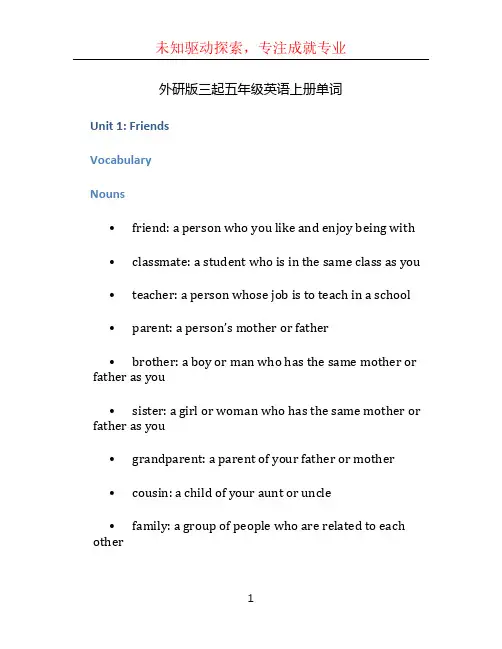
外研版三起五年级英语上册单词Unit 1: FriendsVocabularyNouns•friend: a person who you like and enjoy being with •classmate: a student who is in the same class as you •teacher: a person whose job is to teach in a school •parent: a person’s mother or father•brother: a boy or man who has the same mother or father as you•sister: a girl or woman who has the same mother or father as you•grandparent: a parent of your father or mother•cousin: a child of your aunt or uncle•family: a group of people who are related to each other•pet: an animal that you keep in your house for company or pleasureVerbs•play: to do activities for amusement or enjoyment•study: to learn about a subject by reading, going to classes, etc.•teach: to give lessons about a particular subject to a person or group•help: to do something that makes it easier for someone to do something•clean: to make something free from dirt, marks, etc.•take care of: to look after someone or something and make sure that they have what they need•feed: to give food to someone or something•walk: to move or travel on foot at a pace slower than runningAdjectives•new: not existing before; made, introduced, or discovered recently or now for the first time•old: having lived or existed for a long time•happy: feeling or showing pleasure or contentment •sad: feeling or showing sorrow; unhappy•kind: having or showing a friendly, generous, and considerate natureAdverbs•never: at no time in the past or future•always: at all times; on all occasions Prepositions•with: accompanied by; in addition to•in: situated inside•on: physically in contact with and supported by a surfacePronouns•I: used to refer to oneself as the speaker or writer •you: referring to the person or people that the speaker is addressing•he: used to refer to a male person or animal previously mentioned or easily identified•she: used to refer to a female person or animal previously mentioned or easily identified•they: used to refer to two or more people or things previously mentioned or easily identified•we: used to refer to the speaker together with other people regarded in the same categoryUnit 2: School DaysVocabularyNouns•school: an institution for educating children•classroom: a room in a school where a class of students is taught•desk: a piece of furniture with a flat or sloping surface and typically with drawers, at which one can read, write, or do other work•chalk: a white or colored material used for writing or drawing on a blackboard or other surface•eraser: a small block of rubber or other material used to rub out marks made by a pencil or chalk •pencil: a thin cylindrical pointed writing implement used for marking, drawing, or writing•book: a written or printed work consisting of pages glued or sewn together along one side and bound in covers•bag: a flexible container with an opening at the top, used for carrying things•ruler: a straight strip of rigid material marked at regular intervals and used to measure or draw straight lines•pen: an instrument for writing or drawing with ink, typically consisting of a metal nib or ball, or a nylon tip, fitted into a metal or plastic holderVerbs•write: mark (letters, words, or other symbols) on a surface, typically paper, with a pen, pencil, or similar implement•read: look at and comprehend the meaning of (written or printed matter) by mentally interpreting the characters or symbols of which it is composed•listen: give attention to a sound•answer: say or write something as a reply or response to someone•raise: move to a higher position or level•open: move or adjust (something) so as to allow access, passage, light, etc.•close: move so as to cover an opening•draw: produce (a picture or diagram) by making lines and marks, especially with a pen or pencil, on paper•count: determine the total number of•sing: make musical sounds with the voice, especially words with a set tuneAdjectives•big: of considerable size or extent•small: of a size that is less than normal or usual•heavy: of great weight; difficult to lift or move•light: the natural agent that stimulates sight and makes things visible•long: measuring a great distance from end to end•short: measuring a small distance from end to endAdverbs•here: in, at, or to this place or position•there: in, at, or to a place or position•soon: in or after a short time; before long; quickly•now: at the present time or moment•fast: moving or capable of moving at high speedPrepositions•at: expressing location or arrival in a particular place or position•in: expressing the situation of something that is or appears to be enclosed or surrounded by something else•on: physically in contact with and supported by a surfacePronouns•it: used to refer to a thing previously mentioned or easily identified•its: belonging to or associated with a thing previously mentioned or easily identified。
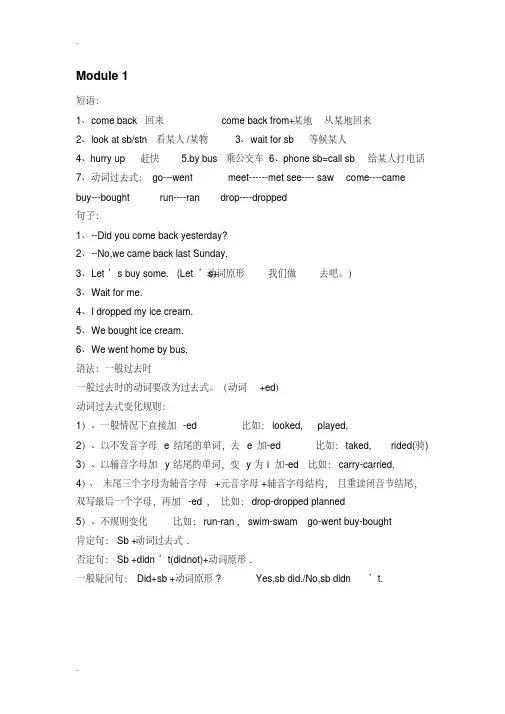
短语:1、come back 回来come back from+某地从某地回来2、look at sb/stn 看某人/某物3、wait for sb 等候某人4、hurry up 赶快 5.by bus 乘公交车6、phone sb=call sb 给某人打电话7、动词过去式:go---went meet------met see---- saw come----camebuy---bought run----ran drop----dropped句子:1、--Did you come back yesterday?2、--No,we came back last Sunday.动词原形我们做······去吧。
)3、Let’s buy some. (Let’s+3、Wait for me.4、I dropped my ice cream.5、We bought ice cream.6、We went home by bus.语法:一般过去时一般过去时的动词要改为过去式。
(动词+ed)动词过去式变化规则:1)、一般情况下直接加-ed 比如:looked, played,2)、以不发音字母 e 结尾的单词,去 e 加-ed 比如:taked, rided(骑) 3)、以辅音字母加y结尾的单词,变y为i 加-ed 比如:carry-carried,4)、末尾三个字母为辅音字母+元音字母+辅音字母结构,且重读闭音节结尾,双写最后一个字母,再加-ed ,比如:drop-dropped planned5)、不规则变化比如:run-ran , swim-swam go-went buy-bought肯定句:Sb +动词过去式.否定句:Sb +didn’t(did n ot)+动词原形.一般疑问句:Did+sb +动词原形? Yes,sb did./No,sb didn’t.短语:1、buy some fruit 买一些水果2、make a shopping list 制定一个购物清单3、also也,放句中;too也,放句末4、some“一些”,接可数名词复数或不可数名词,用在肯定句中any“一些”,接可数名词复数或不可数名词,用在否定句中I have apples.I don’t have apples.Do you have apples?5、half a kilo 半公斤6、a lot of=lots of 许多接可数名词复数或不可数名词7、over there 那边8、动词过去式:buy---bought eat---ate drink---drank句子:1、--What did you buy?---I bought some apples.2、--How many bananas did you buy?--We didn’t buy any bananas.注:How many +可数名词复数+一般疑问句?3、--How much cheese did you buy?--Half a kilo.注:How much +不可数名词+一般疑问句?回答用half a kilo / 数词+kilo(s) / 数词+bottle(s)语法:特殊疑问句特殊疑问句构成:特殊疑问词+一般疑问句?回答时,根据具体情况回答。
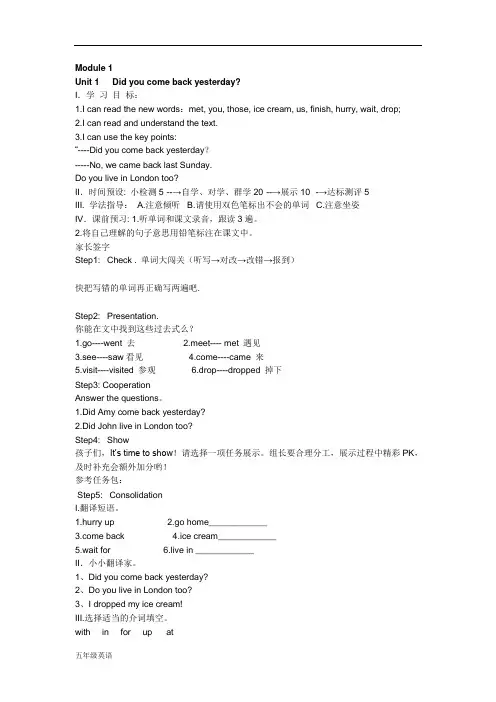
Module 1Unit 1 Did you come back yesterday?I.学习目标:1.I can read the new words:met, you, those, ice cream, us, finish, hurry, wait, drop;2.I can read and understand the text.3.I can use the key points:“----Did you come back yesterday?-----No, we came back last Sunday.Do you live in London too?II.时间预设: 小检测5¹--→自学、对学、群学20¹--→展示10¹ -→达标测评5¹III. 学法指导:A.注意倾听 B.请使用双色笔标出不会的单词 C.注意坐姿IV.课前预习: 1.听单词和课文录音,跟读3遍。
2.将自己理解的句子意思用铅笔标注在课文中。
家长签字Step1: Check . 单词大闯关(听写→对改→改错→报到)快把写错的单词再正确写两遍吧.Step2: Presentation.你能在文中找到这些过去式么?1.go----went 去2.meet---- met 遇见3.see----saw看见e----came 来5.visit----visited 参观6.drop----dropped 掉下Step3: CooperationAnswer the questions。
1.Did Amy come back yesterday?2.Did John live in London too?Step4: Show孩子们,It’s time to show!请选择一项任务展示。
组长要合理分工,展示过程中精彩PK,及时补充会额外加分哟!参考任务包:Step5: ConsolidationI.翻译短语。
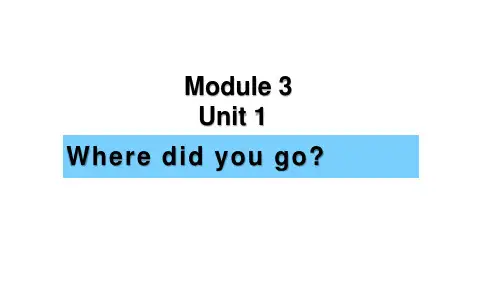
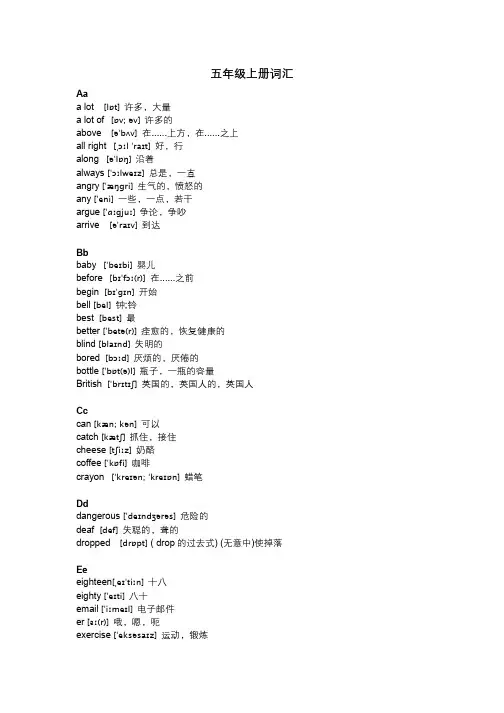
五年级上册词汇Aaa lot [lɒt] 许多,大量a lot of[ɒv; əv] 许多的above[əˈbʌv]在......上方,在......之上all right [ˌɔːl ˈraɪt] 好,行along [əˈlɒŋ] 沿着always[ˈɔːlweɪz] 总是,一直angry[ˈæŋɡri] 生气的,愤怒的any[ˈeni] 一些,一点,若干argue[ˈɑːɡjuː] 争论,争吵arrive [əˈraɪv] 到达Bbbaby [ˈbeɪbi] 婴儿before[bɪˈfɔː(r)]在......之前begin[bɪˈɡɪn] 开始bell [bel] 钟;铃best [best] 最better [ˈbetə(r)] 痊愈的,恢复健康的blind[blaɪnd] 失明的bored[bɔːd] 厌烦的,厌倦的bottle[ˈbɒt(ə)l] 瓶子,一瓶的容量British[ˈbrɪtɪʃ] 英国的,英国人的,英国人Cccan[kæn; kən] 可以catch [kætʃ] 抓住,接住cheese[tʃiːz] 奶酪coffee[ˈkɒfi] 咖啡crayon [ˈkreɪən; ˈkreɪɒn] 蜡笔Dddangerous[ˈdeɪndʒərəs] 危险的deaf [def] 失聪的,聋的dropped[drɒpt] ( drop的过去式) (无意中)使掉落Eeeighteen[ˌeɪˈtiːn] 十八eighty[ˈeɪti] 八十email[ˈiːmeɪl] 电子邮件er [ɜː(r)] 哦,嗯,呃exercise[ˈeksəsaɪz] 运动,锻炼fan [fæn] 狂热仰慕者,迷fantastic [fænˈtæstɪk] 极好的farm[fɑːm] 农场feel[fiːl] 感觉,觉得fifteen[ˌfɪfˈtiːn] 十五fifty[ˈfɪfti] 五十finish[ˈfɪnɪʃ] 吃完,喝完,用尽fire[ˈfaɪə(r)] 火灾,失火firefighter[ˈfaɪəfaɪtə(r)] 消防队员first[fɜːst] 首先,第一;最先的,第一(次)的floor[flɔː(r)] 地面,地板for[fɔː(r); fə(r)] 达,计forty[ˈfɔːti] 四十fourteen[ˌfɔːˈtiːn] 十四Gggive out[ɡɪv aʊt]分发go to bed [bed]上床睡觉goalkeeper[ˈɡəʊlkiːpə(r)] 守门员good at [ɡʊd æt] 擅长grass [ɡrɑːs] 草,草地ground[ɡraʊnd] 地面Hhhalf[hɑːf] 一半happily[ˈhæpɪli] 幸福地,愉快地healthy[ˈhelθi] 健康的hear[hɪə(r)] 听到her [hɜː(r); hə(r)](宾格)她hey[heɪ]嘿,喂hide [haɪd]躲,躲藏hide-and-seek [siːk] 捉迷藏hot dog[ˈhɒt dɒɡ] 热狗hour[ˈaʊə(r)] 小时how[haʊ] 如何,怎样how much[haʊ mʌtʃ] 多少hurry[ˈhʌri] 赶紧,匆忙hurry up['hʌrɪ ʌp] 赶紧,赶快liice cream[ˈaɪs kriːm]冰激凌ill[ɪl] 有病的,不健康的into[ˈɪntuː] 进入.... 里面join[dʒɔɪn]加入,参加Kkkilo [ˈkiːləʊ] 千克kind[kaɪnd] 友好的,善意的,体贴的kitchen[ˈkɪtʃɪn] 厨房LIlast [lɑːst] 最后late [leɪt] 迟到的list [lɪst] 清单lost[lɒst] ( lose的过去式)丢失love[lʌv] 爱你的Mmmany [ˈmeni] 许多,很多matter [ˈmætə(r)]问题,麻烦What's the matter? 怎么啦?met [met] ( meet的过去式)碰上,遇见minute [ˈmɪnɪt] 分钟miss[mɪs] 想念mountain[ˈmaʊntən]山museum[mjuˈziːəm] 博物馆Nnneed[niːd] 需要nineteen[ˌnaɪnˈtiːn] 十九ninety[ˈnaɪnti] 九十now[naʊ] 好,哦number[ˈnʌmbə(r)] 数字Ooof[ɒv; əv] 关于......的,表明......的over there['əʊvə(r) ðeə(r)] 在那边Pppair [peə(r)] 一套,一-双,一副past [pɑːst] 过去; 晚于,过(几点)place[pleɪs] 地方plant[plɑːnt] 植物playground[ˈpleɪɡraʊnd] 操场presenter [prɪˈzentə(r)] (电视或广播节目的)主持人ran [ræn] ( run的过去式) 跑rang [ræŋ](ring的过去式) 鸣,响really[ˈriːəli] 很,非常river [ˈrɪvə(r)] 河,江room[ruːm]房间living room[ˈlɪvɪŋ] 起居室,客厅ruler[ˈruːlə(r)] 直尺Sssad [sæd] 伤心的,难过的sausage[ˈsɒsɪdʒ] 香肠school [skuːl] 上课时间;上学时间send [send] 发送,寄seventeen[ˌsev(ə)nˈtiːn] 十七seventy[ˈsev(ə)nti] 七十shorts[ʃɔːts] (常复)短裤shout[ʃaʊt] 呼喊,大叫show [ʃəʊ](电视或广播)节目sixteen[ˌsɪksˈtiːn] 十六sixty[ˈsɪksti] 六十skipping rope[skɪpɪŋ] [rəʊp] 跳绳slow[sləʊ] 慢的smell [smel] 闻出,嗅出sofa[ˈsəʊfə] 沙发sports[spɔːts] 体育运动的,体育运动用的start[stɑːt] 开始,发生swam [swæm] (swim的过去式) 游泳Tttea [tiː] 茶team[tiːm] 运动队,球队That's OK.没关系。
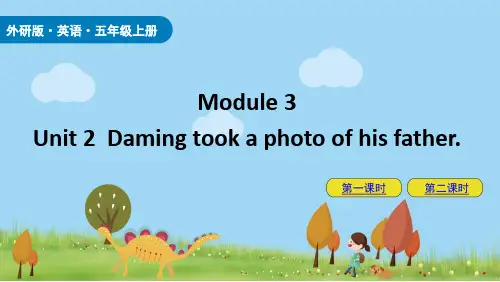
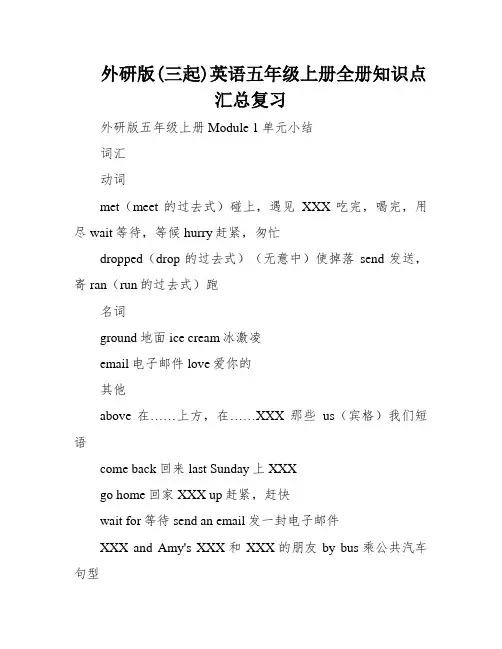
外研版(三起)英语五年级上册全册知识点汇总复习外研版五年级上册Module 1单元小结词汇动词met(meet的过去式)碰上,遇见XXX吃完,喝完,用尽wait等待,等候hurry赶紧,匆忙dropped(drop的过去式)(无意中)使掉落send发送,寄ran(run的过去式)跑名词ground地面ice cream冰激凌email电子邮件love爱你的其他above在……上方,在……XXX那些us(宾格)我们短语come back回来last Sunday上XXXgo home回家XXX up赶紧,赶快wait for等待send an email发一封电子邮件XXX and Amy's XXX和XXX的朋友by bus乘公共汽车句型1.询问某人过去是否做过某事—Did+主语+动词(短语)真相+透露表现过去的工夫?—Yes,主语+did./No,主语+didn't.·—Did you come back XXX?你们昨天回来的吗?—No, we XXX't.不,我们不是昨天回来的。
2.描绘或人过去的动作主语+动词(短语)过去式+其他.·We came back last Sunday.我们上XXX返来的。
3.描述某人过去的状态主语+was/were+描述状态的词+其他.·I was very sorry.我非常抱歉。
外研版五年级上册Module 2单元小结词汇名词list清单cheese奶酪bottle瓶子;一瓶的容量kilo公斤动词need需要can可以lost (lose的过去式)丢失use使用其他er哦,嗯,呃first第一,第一;最先的,第一(次)的any一些,一点,若干half一半短语make a shopping list列一份购物清单half a kilo半千克a lot of许多的over there在那边at XXX在超市how much几何句型1.询问他人买了什么东西的句型及其答语—XXX?—主语+bought+物品.·—What did you buy?你们买了什么?—XXX.我们买了一些苹果。
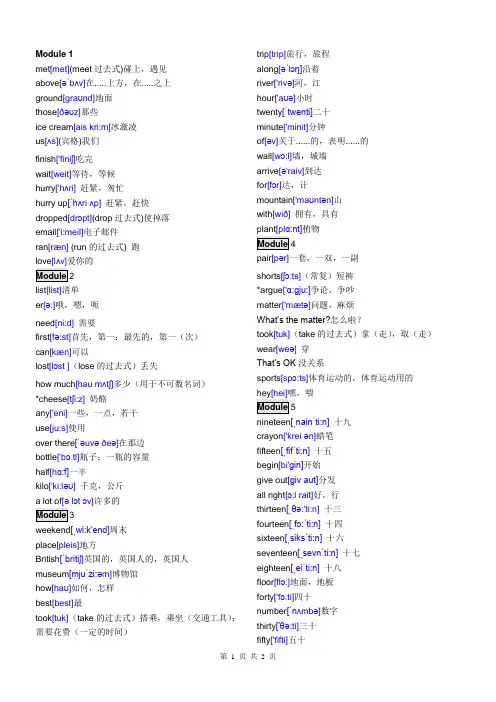
Module 1met[met](meet过去式)碰上,遇见above[əˈbʌv]在.....上方,在.....之上ground[graʊnd]地面those[ðəʊz]那些ice cream[ais kri:m]冰激凌us[ʌs](宾格)我们need[ni:d] 需要first[fə:st]首先,第一;最先的,第一(次)can[kæn]可以lost[lɔst ](lose的过去式)丢失;需要花费(一定的时间)shorts[ʃɔ:ts](常复)短裤*argue['ɑ:ɡju:]争论,争吵matter['mætə]问题,麻烦What’s the matter?怎么啦?took[tuk](take的过去式)拿(走),取(走)wear[weə]穿十七go to bed 上床睡觉exercise ['eks əsaiz] 运动,锻炼 playground ['plei ɡraʊnd] 操场 before [biˈfɔ:] 在……之前 join [d ʒɔ in]加入,参加 )鸣,响 里面 bored 厌烦的,厌倦的 sad [sæd] 伤心的,难过的 woof [wuf](狗发出的)吠声 miss [mis] 想念angry ['æŋ ɡri] 生气的,愤怒的 ill [il]有病的,不健康的 told [t əʊld](tell 的过去式)告诉 better ['be t ə]痊愈的,恢复健康的 farm [f ɑ:m] 农场tired ['tai ə d] 累的,疲劳的 won [w ʌn](win 的过去式)赢,获胜 ruler [ˈru:lə]直尺 smell [smel]闻出,嗅出 Module 10 kitchen ['kit ʃin]厨房toilet ['t ɔi l ət]厕所,卫生间, room [ru:m]房间living room [ˈliviŋ ru:m]起居室,客厅 *hide-and-seek [ˌhaid n ˈsi:k]捉迷藏 now [na ʊ] 好,哦 last [l ɑ:st] 最后 hide [haid] 躲,躲藏 sofa ['s əʊf ə] 沙发 shout [ʃa ʊt] 呼喊,大叫 grass [ɡrɑ:s]草,草地 baby ['bei bi]婴儿dangerous [ˈdein d ʒə r əs]危险的。
全]外研版(三起)小学英语五年级上册知识点归纳总结Module 1In Module 1.XXX。
vocabulary。
fixed phrases。
and XXX.Firstly。
XXX。
such as /iː/ for "Chinese" and "ear"。
/ɪ/ for "it" and "pig"。
and /æ/ for "cat" and "apple".Secondly。
we learned some new words。
including "met" (past tense of "meet")。
"wait"。
"dropped" (past tense of "drop")。
"finish"。
"ran" (past tense of "run")。
"send"。
"ground"。
"ice cream"。
"email"。
"above"。
"those"。
and "us".Thirdly。
XXX phrases。
such as "come back"。
"hurry up"。
"live in"。
"go to the park"。
"go home"。
"by bus"。
"wait for"。
and "last Sunday".Fourthly。
外研版英语五上三年级起点Unit 1 My SchoolIn this unit, we will focus on learning about different aspects of our school. We will explore the school environment, discuss our favorite subjects, and talk about our daily routines.Firstly, let's talk about the school environment. When we enter our school, we see a big playground where we can play during recess. There are swings, slides, and a basketball court. We can also see colorful flowers and trees around the school. The classrooms are on the first floor, and there is a library and a computer room on the second floor. The school is a fun and vibrant place to learn.Next, let's discuss our favorite subjects. In our school, we have many interesting subjects to study. One of my favorite subjects is English. I love learning new words and practicing my speaking skills. We also have math, science, and art. Math is fun because we learn how to solve problems using numbers. In science, we learn about the world around us, including plants, animals, and the weather. Art is another favorite because we get to be creative and express ourselves through drawing and painting.Now, let's talk about our daily routines. In the morning, we arrive at school and put our bags in our lockers. We then have a morning assembly where we sing the national anthem and listen to announcements. After that, we have our first class. We have a short break for recess, and then we continue with our classes. At lunchtime, we go to the cafeteria and eat with our classmates. After lunch, we have a short break before our afternoon classes. At the end of the day, we pack our bags and go home.In addition to our regular classes, we also have extracurricular activities. These activities take place after school and include sports, music, and clubs. I am a member of the basketball club, and we practice every Tuesday and Thursday. I also enjoy playing the piano, so I attend music lessons on Wednesdays.Overall, my school is a great place to learn and make new friends. The school environment is lively and inviting, and we have a variety of interesting subjects to study. Our daily routines keep us organized and help us develop good habits. Additionally, the extracurricular activities provide opportunities for us to pursue our interests outside of regular classes. I am grateful for my school and all the opportunities it offers for my education and personal growth.In conclusion, Unit 1 of the English textbook for third graders in the New Standard Edition focuses on introducing students to their school environment, discussing favorite subjects, and describing daily routines. By learning about these topics, students can develop their English language skills while also gaining a better understanding of their school life.。
外研版(三起)英语五年级上册知识点整理Module 1单词句子短语look different 看起来不同feed the birds 喂小鸟look at 看…the picture of ……的照片lots of = a lot of 很多how about …怎样,如何其他语法点1. Lingling is in London with Sam and Amy.2. You were in China for two years.3. Does London look different now?4. Then let’s feed them.5. There wasn’t a child in my family.6. There be句型现在时与过去时的使用。
Module 2单词句子短语come on 加油over there 在那边helpful children 乐于助人的孩子help sb. do sth 帮助某人做某事其他语法点1. Let’s go to the supermarket. Let me help you.2. Oh, what a big supermarket!3. And there is a lot of fruit, too.4. Have an ice cream.5. Please help me put the bags in the car.6. Sometimes there are restaurants at the supermarket.7. Many families go to the supermarkets together. Module 3单词句子短语Trick or treat 不给糖就捣蛋neighbour’s houses 邻居的家scary clothes 可怕的衣服chocolate eggs 巧克力蛋其他语法点1. It’s an autumn festival in the UK.2. It’s really fun.3. Look at the hats and the masks!4. They go to their neighbour’s houses and ask, “Trick or treat?”5. Here are some sweets!6. There are toy chicks and flowers on the hats.7. Easter is in spring in the UK.8. Sometimes there are small eggs in the big eggs.Module 4单词句子短语tell a story / tell stories 讲故事have lunch 吃午饭have a birthday cake 有一个生日蛋糕see a film 看电影tidy up 整理,收拾其他语法点1. Long, long ago, there was an old man.2. It’s an invitation to my birthday party.3. I’m going to be eleven. 8. at+地点on+日期4. Mum is going to make a birthday cake for me.5. But before that, you are going to help me tidy up.6. Please come to my birthday party.7. be going to + 动原Module 5单词句子短语What’s the matter? 怎么了?want to do…想要做某事Sorry. That’s OK. 对不起。
Module 5 Unit 1 There are only nineteen crayons.优选教案教学目标:知识:能听说认读单词:thirteen,fourteen,fifteen,sixteen,seventeen,eighteen,nineteen ,crayon.技能:能运用句型“there be”描述物品的存在,并区分开There is 和There are 的区别。
情感:培养学生认真观察生活,并能在实际生活中积极用英语进行交流。
教学重难点:1.听说读13-19量词,并能运用句型“there be”描述物品的存在。
2.注意fifteen ,thirteen,eighteen 的发音.3.能区分There is 和There are 的不同用法。
教学准备:PPT,卡片教学方法:游戏法,直观法,演示法教学步骤1.Warmming - up and revisiona.Sing a song about numbers of 1-12.b.Can you say the numbers quickly?(boys PK girls )c.T: Boys and girls ,I’ll choose two numbers from the screen . Look ,here theyare .Can you guess what are they ?d.T: Boys and girls ,whats 5 and 8?Ss:132. Presentation(1)T:Learn new word ‘thirteen’ .T:Boys and girls,what’s this ?Ss:蜡笔(Learn“crayon”)T: How many crayons ?(师出示一把13只蜡笔和一只蜡笔)Ss:14(Learn“fourteen”)(同样方法学习“fifteen ,sixteen ,seventeen,eighteen,nineteen’’,并引导学生找出规律)(2)a.T:Let’s play a game(老师出示加法卡片,两生快速算数,快者胜)b.T: Boys and girls ,look at the PPT,can you say out “what’s missing ?”(学生抢答)(3)T:Boys and girls ,here are some crayons in my hand .How many ? Please guess.S1:13S2:16…T:Very good . There are only nineteen crayons .(师板书课题)3. Drill and practice(1) T:Today is sunny and warm. Let’s go to the zoo.How many …?Oh,there are …T:Can you say out the number of the animals? Have a try . (师出示动物园的图片,学生描述。